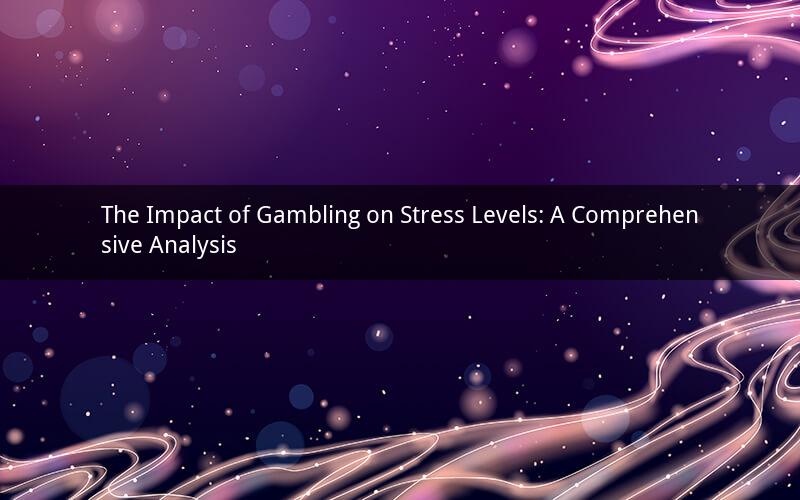
Introduction:
Gambling has long been a subject of debate and controversy. While some individuals may see it as a form of entertainment, others argue that it can lead to significant stress and negative consequences. This article explores the relationship between gambling and stress, examining various aspects and providing insights into the potential effects of gambling on mental health.
1. Understanding Stress and its Causes:
Stress is a natural response to challenging or demanding situations. It can manifest physically, emotionally, and mentally. Several factors contribute to stress, including work-related pressures, financial worries, and personal relationships. However, gambling has emerged as a significant source of stress for many individuals.
2. The Link Between Gambling and Stress:
Research indicates that gambling can have a profound impact on an individual's stress levels. Here are some key reasons why gambling may lead to increased stress:
a. Financial Loss: One of the primary reasons gambling can cause stress is the potential for financial loss. When individuals lose money while gambling, they may experience anxiety, worry, and fear about their financial stability.
b. Social Pressure: Gamblers often face social pressure to continue gambling in order to recover their losses. This pressure can create a sense of obligation and lead to increased stress levels.
c. Loss of Control: Gambling can be addictive, and individuals who struggle with gambling addiction may find it challenging to control their impulses. This loss of control can lead to feelings of frustration, anger, and stress.
d. Relationship Strain: Gambling can strain relationships, as individuals may prioritize gambling over their personal and professional lives. This strain can cause stress and tension within relationships, further impacting overall mental well-being.
3. The Physical and Mental Health Consequences of Stress:
The long-term effects of stress on physical and mental health cannot be ignored. Here are some potential consequences of chronic stress associated with gambling:
a. Physical Health: Stress can manifest physically through various symptoms, including headaches, muscle tension, digestive issues, and insomnia. In severe cases, chronic stress may lead to cardiovascular problems, high blood pressure, and weakened immune system.
b. Mental Health: Stress can contribute to the development of mental health issues such as anxiety, depression, and substance abuse. Individuals who experience high levels of stress due to gambling may find themselves struggling with these conditions.
4. Strategies for Managing Stress Caused by Gambling:
Recognizing the impact of gambling on stress levels is the first step towards managing it effectively. Here are some strategies that individuals can adopt to mitigate the negative effects of gambling-related stress:
a. Seek Support: Reach out to friends, family, or professionals who can offer support and guidance. Support groups or therapy can provide valuable resources and coping mechanisms.
b. Financial Planning: Develop a budget and stick to it. Avoid using credit cards or taking out loans to fund gambling activities, as this can exacerbate financial stress.
c. Time Management: Prioritize your responsibilities and allocate specific time slots for gambling activities. Avoid gambling during crucial periods, such as work or family obligations.
d. Mindfulness and Relaxation Techniques: Engage in mindfulness practices, such as meditation or deep breathing exercises, to reduce stress levels. Regular exercise, hobbies, and spending quality time with loved ones can also contribute to a healthier mental state.
5. Conclusion:
Gambling can indeed cause stress, and its impact on mental and physical health should not be underestimated. By understanding the link between gambling and stress, individuals can take proactive steps to manage their stress levels and minimize the negative consequences associated with gambling. Seeking support, adopting healthy financial habits, and implementing stress-reducing strategies are crucial for maintaining overall well-being.
Questions and Answers:
1. Q: Can gambling addiction lead to stress-related mental health issues?
A: Yes, gambling addiction can contribute to stress-related mental health issues such as anxiety, depression, and substance abuse.
2. Q: How can I identify if my stress is related to gambling?
A: Look for signs of financial strain, changes in relationships, loss of control over gambling, and increased stress levels when engaging in gambling activities.
3. Q: Are there any effective treatments for stress caused by gambling?
A: Yes, therapy, support groups, and adopting stress-reducing strategies can be effective treatments for stress caused by gambling.
4. Q: Can stress caused by gambling lead to physical health issues?
A: Yes, chronic stress can manifest physically through symptoms such as headaches, muscle tension, and weakened immune system.
5. Q: How can I overcome the social pressure to continue gambling?
A: Establish boundaries and communicate your concerns to friends and family. Seek support from professionals or support groups who can help you navigate the challenges of social pressure related to gambling.